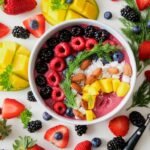Superfoods and functional foods have captured the attention of health enthusiasts and nutritionists alike, offering impressive health benefits. But what exactly are they? Superfoods refer to whole, natural foods that are exceptionally rich in nutrients—think berries, nuts, leafy greens, and seeds. These foods provide high concentrations of antioxidants, vitamins, minerals, and other essential compounds that nourish your body.
On the other hand, functional foods go beyond basic nutrition. These foods, such as probiotic yogurt, fortified cereals, and omega-3-rich fish, are designed to offer specific health benefits. Some are naturally functional, while others are enhanced to target issues like heart health, digestion, and immunity.
These foods have gained popularity not just as dietary trends but as cornerstones of wellness. Whether you’re trying to maintain a healthy weight, boost your energy, or improve mental clarity, superfoods and functional foods can complement your efforts. When consumed regularly, they become powerful tools to support long-term well-being.
Defining Superfoods and Functional Foods
What Are Superfoods?
Superfoods are nutrient powerhouses, packed with essential vitamins, minerals, and antioxidants. Foods like blueberries, kale, chia seeds, and almonds are known for their ability to fight free radicals, protect cells from damage, and provide sustained energy. These foods contain natural compounds that promote overall health.
- Berries: Loaded with antioxidants and vitamin C, they help combat inflammation and oxidative stress.
- Leafy greens: Kale and spinach are rich in vitamin K and iron, supporting bone health and blood oxygenation.
- Nuts and seeds: Almonds, walnuts, and chia seeds provide healthy fats, fibre, and protein for sustained energy.
What Are Functional Foods?
Functional foods, while also nutritious, are specially recognised for addressing specific health concerns. Some examples include probiotic yogurt for gut health, fortified milk with added vitamin D, and whole grains that lower cholesterol.
Functional foods often contain:
- Probiotics: Found in fermented foods, they support digestion and boost immunity.
- Omega-3 fatty acids: Present in fatty fish like salmon, these are known to improve brain and heart health.
- Polyphenols: Found in green tea, these compounds enhance metabolism and reduce inflammation.
Both superfoods and functional foods can significantly improve your health, making them valuable dietary staples for your long-term well-being.
Nutritional Benefits and Key Nutrients

Superfoods and functional foods offer vital nutrients that support everything from energy production to disease prevention. Here’s a breakdown of some key nutrients they provide:
- Antioxidants: Found in berries and dark chocolate, these compounds neutralise free radicals and reduce oxidative stress, protecting against chronic diseases.
- Fibre: Oats, quinoa, and chia seeds are rich in fibre, aiding digestion, stabilising blood sugar levels, and promoting heart health.
- Vitamins and minerals: Leafy greens like spinach contain vitamins A, C, and K, while nuts provide magnesium and zinc, supporting immunity and bone strength.
In addition to these, functional foods like probiotic yogurt offer beneficial bacteria that restore gut flora and improve digestion. Omega-3-rich fish, such as salmon and mackerel, reduce inflammation, which benefits heart health and brain function.
How Superfoods and Functional Foods Promote Long-Term Health
Including superfoods and functional foods in your diet can have profound effects on your health over time. Here’s how:
- Heart Health:
Foods like oats, fatty fish, and almonds are known to reduce cholesterol and improve heart function. Omega-3 fatty acids in fish lower blood pressure and prevent arterial blockages. - Brain Function and Cognitive Health:
Blueberries, walnuts, and green tea are linked to improved memory and cognitive performance. Omega-3s in fish also protect against age-related cognitive decline. - Immune Support:
Vitamin C-rich fruits like oranges and strawberries boost your immune system. Probiotic-rich foods such as yogurt and kimchi enhance gut health, which directly impacts immune function. - Digestive Health:
Fermented foods—like kefir and sauerkraut—promote a healthy gut by increasing beneficial bacteria, aiding digestion, and reducing bloating.
These foods not only provide short-term benefits but also help prevent lifestyle diseases like diabetes, heart disease, and obesity, supporting your health in the long run.
Incorporating Specific Health Goals

Superfoods and functional foods can align with your personal health goals, helping you achieve sustainable results:
- Weight Management:
Foods like green tea, avocados, and quinoa keep you feeling fuller longer, reducing overeating. Chia seeds and flaxseeds contain soluble fibre, which slows digestion and helps regulate hunger. - Mental Well-Being:
Dark chocolate and fatty fish are known to improve mood by increasing serotonin levels. Magnesium-rich foods like nuts can help reduce anxiety. - Energy Boost:
Bananas, whole grains, and quinoa provide slow-releasing carbohydrates for steady energy throughout the day. Pairing complex carbs with healthy fats ensures you avoid energy crashes.
Scientific studies also support the benefits of these foods. For instance, research shows that blueberries can enhance memory, while green tea promotes fat oxidation, helping with metabolism.
Tips for Including These Foods in Daily Life
Incorporating superfoods and functional foods doesn’t have to be difficult. Here are some practical tips:
- Start Small: Add a handful of berries to your cereal or yogurt.
- Swap Ingredients: Replace white rice with quinoa for added fibre and protein.
- Try New Recipes: Make smoothie bowls with spinach, bananas, and chia seeds, or bake salmon with a side of roasted vegetables.
- Plan Snacks: Snack on nuts or enjoy a probiotic yogurt in the afternoon to keep your energy up.
Experiment with combining different foods to keep things interesting. You can also explore fermented foods, like miso soup or kombucha, to support gut health naturally.
Potential Risks or Limitations
While superfoods and functional foods offer many benefits, it’s important to approach them with balance and awareness.
- Allergies: Some people may be allergic to nuts, seafood, or dairy, which are common in superfood and functional food categories.
- Overconsumption: Eating too much of certain foods—like chia seeds—can cause digestive discomfort. Similarly, green tea supplements in excess may lead to headaches or nausea.
- Cost and Accessibility: Some superfoods, like goji berries or quinoa, can be expensive. Look for local alternatives, such as seasonal fruits or whole grains.
Moderation and variety are key to enjoying the benefits without any downsides.
Conclusion
Superfoods and functional foods are valuable additions to your diet that can promote long-term health. They provide essential nutrients, boost immunity, improve digestion, and support mental and physical well-being. Incorporating them into your meals is a practical way to achieve sustainable health goals.
Remember, change doesn’t happen overnight. Start small by adding a new superfood or functional food each week. Over time, these healthy habits will become part of your routine, helping you build a healthier lifestyle step by step.
Why not start today? Pick a superfood, try a new recipe, and enjoy the journey toward better health and well-being.





